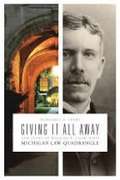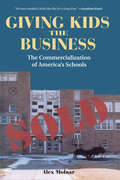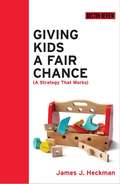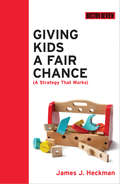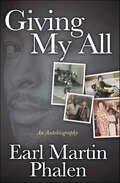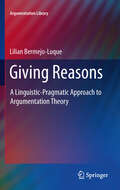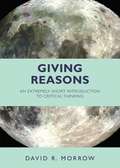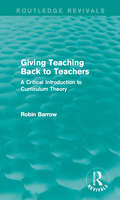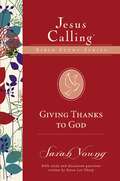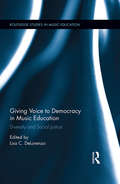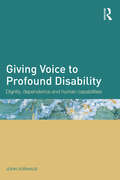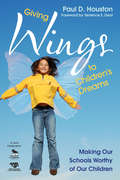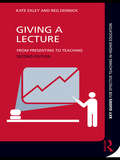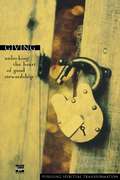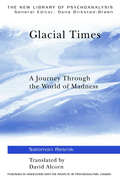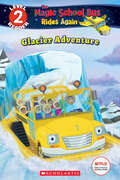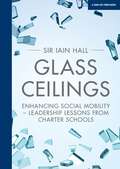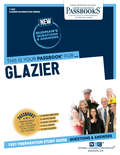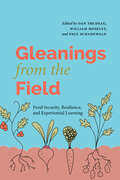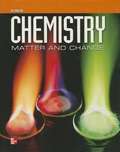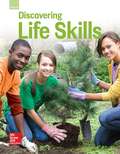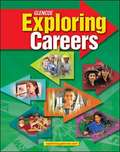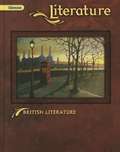- Table View
- List View
Giving It All Away: The Story of William W. Cook and His Michigan Law Quadrangle
by Margaret A. Leary"Margaret Leary's carefully researched book illuminates a complex man who marked his university in a truly enduring way. " ---Francis X. Blouin Jr. , Director, Bentley Historical Library, and Professor, School of Information and Department of History, University of Michigan "Generations of Michigan Law grads have passed on myths about their generous but eccentric benefactor. . . . Now Margaret Leary has given us the real story, and it reads like a gripping whodunit. " ---Theodore J. St. Antoine, James E. and Sarah A. Degan Professor Emeritus of Law and Past Dean, University of Michigan Law School "In an absorbing book, Margaret Leary unstintingly investigates unpublished, archival material to unravel enigmas surrounding William Wilson Cook. She brings to life Cook's brilliant interactions with powerful moguls of the early twentieth century as she traces his lofty, philanthropic mission to elevate the legal profession. " ---Ilene H. Forsyth, Arthur F. Thurnau Professor of the History of Art, emerita, University of Michigan William W. Cook, born in 1858 and a graduate of the University of Michigan and of its law school, made his fortune by investing in the burgeoning telegraph and communications industry, as well as in representing the Mackay Company in their frequent tumultuous battles with Western Union and the U. S. government. Though Cook entered New York society and never returned to Michigan after receiving his law degree, he decided not just to give his alma mater the finest physical facility of any existing law school, but to donate permanent resources that would permit the law school to engage in groundbreaking legal research. However, his generosity proved controversial and eventually very litigious. Margaret A. Leary places Cook's story in the rich social and cultural context of his time and paints a fascinating portrait of a complex figure whose legacy continues to shape the University of Michigan. Cover photographs: (left) Gregory Fox Photography; (right) Ann B. Cook collection, photo by Russell R. Serbay
Giving Kids The Business: The Commercialization Of America's Schools
by Alex MolnarGiving Kids the Business exposes the ways in which corporate America is turning schools into profit centers, the curriculum into an advertising vehicle, and children into a cash crop. Learn how market-oriented school reforms take money out of your pocket and lower the quality of public education. This book sounds the alarm over schools being used by marketers to pitch their products to our nations children. }The commercialization of public education is upon us. With much fanfare and plenty of controversy, plans to cash in on our public schools are popping up all over the country. Educator and social commentator Alex Molnar has written the first book to both document the commercial invasion of public education and explain its alarming consequences.Imagine that your son is given a Gushers fruit snack, told to burst it between his teeth, and asked by his teacher to compare the sensation to a geothermic eruption (compliments of General Mills). Imagine your daughter being taught a lesson about self-esteem by being asked to think about good hair days and bad hair days (compliments of Revlon.) Imagine that to cap off a day of world class learning, your childs teacher shows a videotape that explains that the Valdez oil spill wasnt so bad after all (compliments of Exxon). Giving Kids the Business explains why hot-button proposals like Channel One, an advertising-riddled television program for schools; for-profit public schools run by companies such as the Edison Project and Education Alternatives, Inc.; taxpayer-financed vouchers for private schools; and the relentless interference of corporations in the school curriculum spell trouble for Americas future. Anyone curious about how schools are being turned into marketing vehicles, how education is being recast as a commercial transaction, and how children are being cultivated as a cash crop will want to read Giving Kids the Business. } The commercialization of public education is upon us. With much fanfare and plenty of controversy, plans to cash in on our public schools are popping up all over the country. Educator and social commentator Alex Molnar has written the first book to both document the commercial invasion of public education and explain its alarming consequences.Imagine that your son is given a Gushers fruit snack, told to burst it between his teeth, and asked by his teacher to compare the sensation to a geothermic eruption (compliments of General Mills). Imagine your daughter being taught a lesson about self-esteem by being asked to think about good hair days and bad hair days (compliments of Revlon.) Imagine that to cap off a day of world class learning, your childs teacher shows a videotape that explains that the Valdez oil spill wasnt so bad after all (compliments of Exxon). Giving Kids the Business explains why hot-button proposals like Channel One, an advertising-riddled television program for schools; for-profit public schools run by companies such as the Edison Project and Education Alternatives, Inc. ; taxpayer-financed vouchers for private schools; and the relentless interference of corporations in the school curriculum spell trouble for Americas children.With political races, legislative issues, and judicial challenges regarding education reform from Massachusetts to California, this book will explain whats behind the headlines in every state.
Giving Kids a Fair Chance
by James J. HeckmanIn Giving Kids a Fair Chance, Nobel Prize-winning economist JamesHeckman argues that the accident of birth is the greatest source of inequality in America today. Children born into disadvantage are, by the time they start kindergarten, already at risk ofdropping out of school, teen pregnancy, crime, and a lifetime of low-wage work. This is bad for allthose born into disadvantage and bad for American society. Current social andeducation policies directed toward children focus on improving cognition, yet success in liferequires more than smarts. Heckman calls for a refocus of social policy toward early childhoodinterventions designed to enhance both cognitive abilities and such non-cognitive skills asconfidence and perseverance. This new focus on preschool intervention would emphasize improving theearly environments of disadvantaged children and increasing the quality of parenting whilerespecting the primacy of the family and America's cultural diversity. Heckmanshows that acting early has much greater positive economic and social impact than laterinterventions -- which range from reduced pupil-teacher ratios to adult literacy programs toexpenditures on police -- that draw the most attention in the public policy debate. At a time whenstate and local budgets for early interventions are being cut, Heckman issues an urgent call foraction and offers some practical steps for how to design and pay for newprograms. The debate that follows delves deeply into some of the most fraughtquestions of our time: the sources of inequality, the role of schools in solving social problems,and how to invest public resources most effectively. Mike Rose, Geoffrey Canada, Charles Murray,Carol Dweck, Annette Lareau, and other prominent experts participate.
Giving Kids a Fair Chance (Boston Review Books)
by James J. HeckmanA top economist weighs in on one of the most urgent questions of our times: What is the source of inequality and what is the remedy?In Giving Kids a Fair Chance, Nobel Prize-winning economist James Heckman argues that the accident of birth is the greatest source of inequality in America today. Children born into disadvantage are, by the time they start kindergarten, already at risk of dropping out of school, teen pregnancy, crime, and a lifetime of low-wage work. This is bad for all those born into disadvantage and bad for American society.Current social and education policies directed toward children focus on improving cognition, yet success in life requires more than smarts. Heckman calls for a refocus of social policy toward early childhood interventions designed to enhance both cognitive abilities and such non-cognitive skills as confidence and perseverance. This new focus on preschool intervention would emphasize improving the early environments of disadvantaged children and increasing the quality of parenting while respecting the primacy of the family and America's cultural diversity. Heckman shows that acting early has much greater positive economic and social impact than later interventions—which range from reduced pupil-teacher ratios to adult literacy programs to expenditures on police—that draw the most attention in the public policy debate. At a time when state and local budgets for early interventions are being cut, Heckman issues an urgent call for action and offers some practical steps for how to design and pay for new programs.The debate that follows delves deeply into some of the most fraught questions of our time: the sources of inequality, the role of schools in solving social problems, and how to invest public resources most effectively. Mike Rose, Geoffrey Canada, Charles Murray, Carol Dweck, Annette Lareau, and other prominent experts participate.
Giving My All: An Autobiography of Earl Martin Phalen
by Earl Martin PhalenGiving My All captures the journey of Earl Martin Phalen as he navigates family, self-identity and purpose.As a black boy adopted into a large, loving Irish Catholic family at age two, Earl discovered at a young age that he was meant to stand out. Yet whether it was on the basketball court or early in his career as a young and ambitious “edupreneur,” Earl encountered opportunities that required him to give his all, but often found himself holding back. Earl faced both subtle and overt racism in his predominantly white neighborhoods, but with the love and unrelenting support of his family, he was able to overcome much—facing it most directly and intentionally for the first time when he arrived on Yale campus as a young athlete scholar. While at Yale, Earl gained a new sense of pride and purpose as he connected with his black and African American heritage. This would continue throughout his studies and into graduate school at Harvard Law, where his calling to education—particularly that of black and brown children—came to life. Earl has dedicated his life to improving the access poor, black and brown children have to quality education and opportunities.
Giving Reasons
by Lilian Bermejo LuqueThis book provides a new, linguistic approach to Argumentation Theory. Its main goal is to integrate the logical, dialectical and rhetorical dimensions of argumentation in a model providing a unitary treatment of its justificatory and persuasive powers. This model takes as its basis Speech Acts Theory in order to characterize argumentation as a second-order speech act complex. The result is a systematic and comprehensive theory of the interpretation, analysis and evaluation of arguments. This theory sheds light on the many faces of argumentative communication: verbal and non-verbal, monological and dialogical, literal and non-literal, ordinary and specialized. The book takes into consideration the major current comprehensive accounts of good argumentation (Perelman's New Rhetoric, Pragma-dialectics, the ARG model, the Epistemic Approach) and shows that these accounts have fundamental weaknesses rooted in their instrumentalist conception of argumentation as an activity oriented to a goal external to itself. Furthermore, the author addresses some challenging meta-theoretical questions such as the justification problem for Argumentation Theory models and the relationship between reasoning and arguing.
Giving Reasons: An Extremely Short Introduction to Critical Thinking
by David R. MorrowGiving Reasons prepares students to think independently, evaluate information, and reason clearly across disciplines. Accessible to students and effective for instructors, it provides plain-English exercises, helpful appendices, and a variety of online supplements.
Giving Teaching Back to Teachers: A Critical Introduction to Curriculum Theory (Routledge Revivals)
by Robin BarrowThis book, first published in 1984, aims to bring together the interests of the theory and practice of the education system and, within the former, relate the approaches and claims of the constituent disciplines to each other. Throughout the book, while arguing for the importance of facing up to the logical links between theory and practice, the author seeks to point out the extent to which more educational theory has had little to say of importance for practice, either because it has been a poor theory or because it has concerned itself with matters of little significance to educators. This book will be of interest to students of education, as well as educators themselves.
Giving Thanks to God (Jesus Calling Bible Studies)
by Sarah YoungIn Giving Thanks to God, the fifth study in the Jesus Calling® Bible Study Series, you will explore what God's Word has to say about the many ways He provides for you--and why you should give thanks to Him for this abundance. Even when you are going through trials, you can have an attitude of thankfulness, for the Bible says that you have been given "every spiritual blessing in Christ" (Ephesians 1:3). When you realize the depth of God's love and the lengths He went to reconcile you to Himself, it naturally causes you to want to praise Him! Each of the Jesus Calling® Bible studies includes devotional readings from Jesus Calling®, selected passages of Scripture for reflection, Bible study questions, and additional questions to help you apply the material. This study can be used for personal reflection and Bible study or in a small-group setting.
Giving Voice to Democracy in Music Education: Diversity and Social Justice in the Classroom (Routledge Studies in Music Education)
by Lisa C. DeLorenzoThis book examines how music education presents opportunities to shape democratic awareness through political, pedagogical, and humanistic perspectives. Focusing on democracy as a vital dimension in teaching music, the essays in this volume have particular relevance to teaching music as democratic practice in both public schooling and in teacher education. Although music educators have much to learn from others in the educational field, the actual teaching of music involves social and political dimensions unique to the arts. In addition, teaching music as democratic practice demands a pedagogical foundation not often examined in the general teacher education community. Essays include the teaching of the arts as a critical response to democratic participation; exploring democracy in the music classroom with such issues as safe spaces, sexual orientation, music of the Holocaust, improvisation, race and technology; and music teaching/music teacher education as a form of social justice. Engaging with current scholarship, the book not only probes the philosophical nature of music and democracy, but also presents ways of democratizing music curriculum and human interactions within the classroom. This volume offers the collective wisdom of international scholars, teachers, and teacher educators and will be essential reading for those who teach music as a vital force for change and social justice in both local and global contexts.
Giving Voice to Profound Disability: Dignity, dependence and human capabilities
by John VorhausGiving Voice to Profound Disability is devoted to exploring the lives of people with profound and multiple learning difficulties and disabilities, and brings together the voices of those best placed to speak about the rewards and challenges of living with, supporting and teaching this group of vulnerable and dependent people – including parents, carers and teachers. Along with their personal insights the book offers philosophical reflections on the status, role and treatment of profoundly disabled people, and the subjects discussed include: Respect and human dignity Dependency Freedom and human capabilities Rights, equality and citizenship Valuing people Caring for others The experience and reflections presented in this book illustrate the progress and achievements in supporting and teaching people with profound disabilities, but they also reveal the challenges involved in enabling them to develop their full potential. It is suggested, also, that these challenges apply not only to this group, but also to people who, through sickness, accident and old age, face equivalent levels of dependency and disability. Giving Voice to Profound Disability will be of interest to all those involved in the lives of severely and profoundly disabled people, including parents, carers, teachers, nurses, therapists, academics, researchers, students and policymakers.
Giving Wings to Children’s Dreams: Making Our Schools Worthy of Our Children
by Paul D. HoustonThe former director of the American Association of School Administrators outlines a coherent countervision for turning schools back into places that nurture children.
Giving a Lecture: From Presenting to Teaching (Key Guides for Effective Teaching in Higher Education)
by Kate Exley Reg DennickThe second edition of Giving a Lecture builds upon the reputation and success of the Key Guides for Effective Teaching in Higher Education series. It is an excellent resource for those new to teaching at the University and College level and for those who just want to reflect upon and refresh their lecturing practice. The best selling first edition has been fully revised, and this edition continues to cover all the basics on how to go about lecturing while maintaining its jargon-free and accessible style. New lecturers will find the second edition equips them with the essential tools and guidance for delivering a successful lecture, and explains exciting new developments along with the fundamentals of lecturing. Addressing a number of rapid developments that have occurred since its first publication in 2004, the second edition provides: A new chapter on podcasting and e-lecturing Much more on the effective use of PowerPoint Guidance on using interactive handsets to promote active learning and engagement Consideration of the role of Lectures in problem based learning (PBL) courses An expanded chapter that addresses current diversity/inclusivity issues A fresh look with new Illustrations Updated 'Recommended Reading and Web-Resource' sections This handy guide uses a multi-disciplinary approach based on sound educational theory to provide clear guidance and engaging ideas on giving a memorable and motivational lecture. Readers will find its straightforward approach is both readable and very practical, and new University and College Teachers, Graduate Teaching Assistants, Part-time Tutors, Teaching Clinicians and Practitioners, together with those interested in educational and staff development, will find this book provides them with all the guidance they need to lecture with confidence and skill.
Giving: Unlocking the Heart of Good Stewardship (Pursuing Spiritual Transformation)
by John Ortberg Laurie Pederson Judson PolingJesus said more about money than just about any other topic. Clearly, it is an important issue--and a touchy one! Deep down, we know it is not a matter of what we earn but how we manage what we earn that shows our ultimate priorities.Giving demonstrates how good stewardship is more than a responsibility—it’s an adventure. As you study the connection between your wallet and your heart, you’ll learn how money management is a powerful tool for shaping your character. You’ll discover how giving is as much a part of spiritual growth as prayer and Bible study. And you’ll learn about the rewards of cultivating wise financial habits and a generous heart. Above all, you’ll find out how a lifestyle of giving reflects the heart of God, who freely gives his best to you.Leader’s guide included!Giving group sessions are:Money: Why Is It So Important to God?The Open Hands of GodTithing: A Training Exercise for the HeartBehind the Scenes of DebtWhat Is a Biblical Lifestyle?Cultivating a Heart of CompassionThe Chance of a Lifetime
Glacial Times: A Journey through the World of Madness (The New Library of Psychoanalysis)
by Salomon ResnikIn Glacial Times, Salomon Resnik brings together various facets of his work as a psychoanalyst and psychiatrist, working in both the private sector and in institutional settings and in a wide range of cultural contexts, to provide a careful summary of a lifetime of clinical work. Drawing on a wide range of psychoanalytic, philosophical and literary sources, and vignettes from the author's extensive clinical experience, this book brings the subject of psychosis to life and demonstrates how the study of psychoanalysis and psychosis forces us to confront fundamental ontological questions. Subjects covered include: Transmission and Learning The role of the body in psychosis The Universe of Madness: Frozen words and thoughts The Internal world and the philosophy of the unconcsious Psychotic thinking and language The Symbolic order and its deficiencies. This synthesis of over fifty years of experience as a psychoanalyst and psychiatrist treating psychotic patients will fascinate anyone working in these fields.
Glacier Adventure (Scholastic Reader, Level 2)
by Samantha BrookeHop aboard the Magic School Bus for a whole new adventure about glaciers that is out of this world.Next stop...The Magic School Bus heads to Antarctica to learn about glaciers! D.A. is more of a researcher than a storyteller, so she's naturally nervous when her parents sign her up to speak in front of a sellout crowd. But thanks to the Friz, D.A. gains inspiration from the greatest storytellers on Earth: glaciers! These mighty, frozen time machines guide the class through the Earth's last 10,000 years, and the incredible tale of the changes it has witnessed.
Glass Ceilings: Enhancing Social Mobility: Leadership Lessons From Charter Schools
by Iain HallAfter a Damascene moment following a school trip to the US, Sir Iain Hall realised the UK's approach to urban education is all wrong. In Glass Ceilings, the hugely experienced and respected educator lays out his vision to get social mobility moving again in the UK.
Glass Ceilings: Enhancing Social Mobility: Leadership Lessons From Charter Schools
by Iain HallAfter a Damascene moment following a school trip to the US, Sir Iain Hall realised the UK's approach to urban education is all wrong. In Glass Ceilings, the hugely experienced and respected educator lays out his vision to get social mobility moving again in the UK.
Glazier: Passbooks Study Guide (Career Examination Series)
by National Learning CorporationThe Glazier Passbook® prepares you for your test by allowing you to take practice exams in the subjects you need to study. It provides hundreds of questions and answers in the areas that will likely be covered on your upcoming exam, including but not limited to: Glass properties and installation; Safe work practices; Understanding and interpreting written material; Arithmetical reasoning; and more.
Gleanings from the Field: Food Security, Resilience, and Experiential Learning
by Dan Trudeau, William Moseley Paul SchadewaldIn recent years, the concept of “food security” has garnered significant attention among policymakers, activists, and educators. Stemming from a growing awareness of the complexities surrounding access to sufficient food globally, movements advocating for food justice and sovereignty have emerged in response to these systemic inequities and health disparities, particularly in local communities. With the COVID-19 pandemic, conflicts in regions such as Ukraine and Gaza, and the escalating impacts of climate change, reliable food security has become exacerbated by these existing disparities. Gleanings from the Field argues that addressing food security is essential for tackling broader sustainability challenges facing humanity and recognizes the role of food in community-building, cultural exchange, and quality of life. However, promoting food security entails navigating intricate trade-offs, such as balancing economic interests in food supply with environmental concerns. This timely essay collection frames our food security challenges as “wicked problems,” puzzles without clear solutions that are characterized by evolving complexities and divergent stakeholder priorities. In classroom settings, they argue for the usage of experiential learning to cultivate “wicked problem-solving skills” among students. Gleanings from the Field exemplifies this approach, offering pedagogical interventions to prepare students for tackling these wicked problems, while advocating for high-impact learning experiences that enable students to grapple with the interconnected systems influencing food security. Through hands-on experiences and reflective practice, students gain a deeper understanding of these systems and their societal implications. Importantly, the contributions outlined in this volume underscore the need for a multidimensional view of food security, thus examining the intersections of economic interests, government policies, and social movements. By contextualizing food security within broader political-economic arrangements, educators can empower students to enact meaningful change. Gleanings from the Field argues for a holistic approach to food security education, one that acknowledges the fraught nature of wicked problems and equips students with the skills and knowledge needed for effective action. By integrating experiential learning, conceptual frameworks about food security and resilience, and real-world engagement, educators can cultivate a new generation of resilient problem-solvers committed to addressing food insecurity and other wicked problems.
Glencoe Algebra 1
by Gilbert J. Cuevas Roger Day John A. CarterGlencoe High School Math Series is about connecting math content, rigor, and adaptive instruction for student success
Glencoe Chemistry: Matter and Change
by Dinah Zike Thandi Buthelezi Laurel Dingrando Nicholas Hainen Cheryl WistromThis textbook on Chemistry covers Introduction to Chemistry, Analyzing Data, Electrons in Atoms, Chemical Reactions, Gases, Mixtures and Solutions, Acids and Bases, Electrochemistry, Hydrocarbons, the Chemistry of Life, Nuclear Chemistry and many more...
Glencoe Discovering Life Skills (Discovering Life Skills Series)
by McGraw-Hill EducationDiscovering Life Skills prepares students for the future and putting them on the path towards discovery and excellence. Students are encouraged to discover exciting career paths, determine goals, and manage their lives. <P><P>Differentiated teaching involves all students and allows teachers to better understand the needs of the classroom. Discovering Life Skills contains a wealth of information! The trick is to know where to look to find all of the information. <P><P>The book contains Scavenger Hunt to preview the text and help you get the most out of this book.
Glencoe Exploring Careers: Program Resources
by Joan Kelly-Plate Ruth Volz-PattonThe book explores each of the 16 career cluster options and workplace reality for middle school students. This text prepares students for the rapidly changing opportunities in the work world. As they explore each of the 16 U.S. Department of Education career clusters, they'll build foundation skills and workplace competencies and learn how each new skill can help them build successful careers.
Glencoe Literature - British Literature
by Jacqueline Jones Royster Beverly Ann Chin Jeffrey D. Wilhelm Douglas Fisher"The two most engaging powers of an author are to make new things familiar, and familiar things new. " - Samuel Johnson (1709-1784) Glencoe Literature for 2002 also "makes new things familiar and familiar things new. " Designed to meet the needs of today's classroom, Glencoe Literature has been developed with careful attention to instructional planning for teachers, strategic reading support, and universal access that meets the learning needs of all students.
